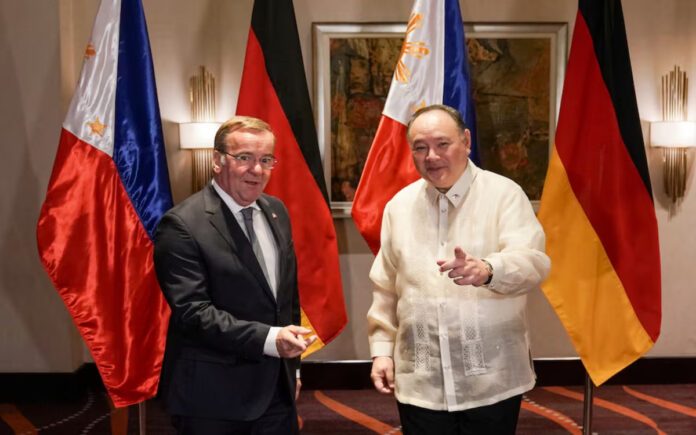Manila: The Philippines and Germany have pledged to finalize a broader defence cooperation agreement, according to a joint statement from their defence ministers on Sunday. German Defence Minister Boris Pistorius met with Philippine Defence Secretary Gilberto Teodoro in Manila to bolster collaboration between the two countries, which are marking 70 years of diplomatic relations.
The commitment includes establishing long-term ties between their armed forces, enhancing training and bilateral exchanges, exploring expanded armaments cooperation, and engaging in joint projects. The move comes amid heightened tensions between China and the Philippines, particularly in the disputed South China Sea, where recent incidents have strained relations. These include accusations that China intentionally rammed Philippine navy boats, resulting in injuries to a Filipino sailor.
China claims sovereignty over much of the South China Sea, overlapping with exclusive economic zones claimed by Vietnam, the Philippines, Malaysia, Brunei, and Indonesia. In 2016, the Permanent Court of Arbitration in The Hague ruled that Beijing’s claims lack legal foundation, a decision China has rejected.
Also Read | Nigerian President Advocates for Dialogue, End to Violent Protests
Teodoro and Pistorius reaffirmed that the tribunal’s ruling on the South China Sea is “final and legally binding.”
Additionally, Germany recently joined the U.S.-led United Nations Command in South Korea as its 18th member, demonstrating Berlin’s view that European security is closely tied to the Indo-Pacific region. Pistorius emphasized that this step reflects Germany’s commitment to global security.
Also Read | Tropical Storm Debby Set to Become Hurricane, Posing Severe Risks for Florida
The U.S. and its allies continue to expand their global alliances, a development that has raised concerns in China about increasing ties between NATO members and Asian nations like Japan, South Korea, and the Philippines.



